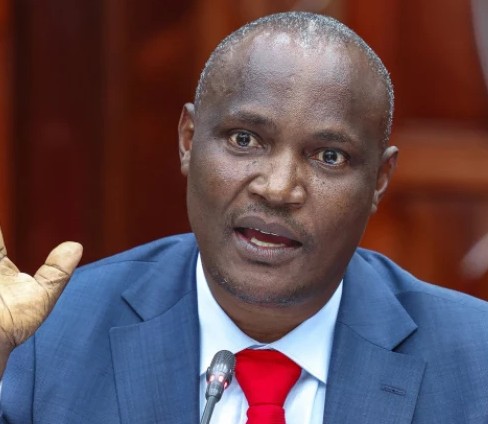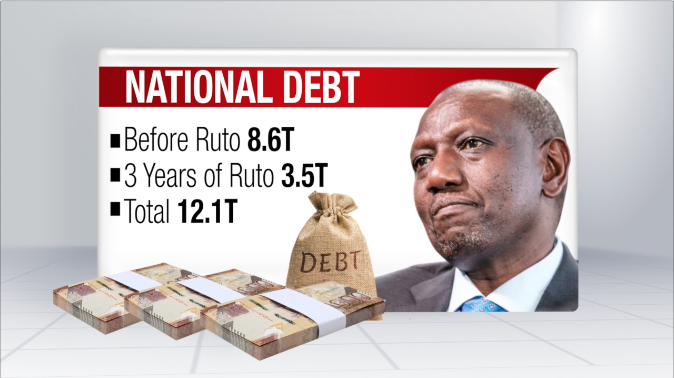
Treasury Cabinet Secretary John Mbadi. Photo/Citizen Digital
By Newsflash Team
The Ministry of Defence emerged as one of the top beneficiaries in the Sh4.2 trillion budget for the 2025/26 fiscal year, which was approved by the National Assembly following the adoption of the Budget and Appropriations Committee’s report on the estimates.
While defence spending rose, allocations to primary, junior, and senior secondary schools were reduced by Sh5.9 billion.
Public school meal programmes were also not spared, taking a Sh600 million cut from the initial Sh3.6 billion set for the financial year beginning July 1, 2025.
The reduced education capitation is aimed at covering the cost of national examination administration and supervision, which had been overlooked in the Treasury’s original printed budget estimates. In addition to the Sh201 billion allocated to Defence, the budget includes Sh2 billion for military recruitment and a Sh5 billion increment for operations in Somalia.
Defence was further awarded an extra Sh6 billion for security operations, following a National Treasury proposal to amend the committee’s report, which was chaired by Alego Usonga MP Samuel Atandi. While the Defence Ministry saw significant gains, the education sector bore the brunt of reallocation, losing Sh5.9 billion in capitation meant for school exam management. Another Sh250 million was trimmed from the ICT Integration programme for secondary schools. Of the education capitation cuts, senior secondary schools lost Sh3 billion, junior schools Sh2 billion, and primary schools Sh900 million.
Development projects and social programmes cut
The government’s development budget of Sh700 billion was slashed by Sh3.5 billion. This included a Sh100 million cut from the Health Insurance Subsidy Programme for Orphans and Vulnerable Children. Universal Health Coverage (UHC) faced reductions too, with Sh2.5 billion dropped from the Strategic Response to Public Initiatives, Sh2 billion from the Emergency, Chronic and Critical Illness Fund, Sh100 million from Primary Health Care, and Sh20 million from the Disease Surveillance and Response Unit’s emergency and refugee assistance component.
Read more: Kagwe demands 10% budget for agriculture
Further affected sectors included a Sh620 million cut from teacher training programmes, Sh520 million from rural electrification, and Sh500 million from subsidies to private financial firms. Environmental and digital infrastructure also took a hit, with Sh650 million slashed from the tree-planting and rangeland restoration initiative, Sh400 million from budget reserves, Sh300 million from the e-procurement system, and Sh400 million from the contingency fund. The IFMIS programme saw a Sh330 million reduction, affecting funds meant for renewing Oracle software licences.
Additional budget reductions included Sh1 billion from the Equalisation Fund, Sh1.3 billion from support to government-sponsored students in private universities, Sh250 million from the
Rural electrification boosted
University of Eldoret’s engineering complex, and Sh250 million from the Open University project. However, rural electrification got a boost, receiving Sh950 million for constituency-level works, including transformer installations, and Sh180 million for street lighting. The Directorate of Criminal Investigations (DCI) saw an increase of Sh400 million, while Sh800 million was earmarked for police operations under the Office of the Inspector General, including Sh150 million for VHF communication equipment.
Read more:Governors threaten shutdown over Sh38 billion budget cut
Also receiving a boost were the new administrative units—locations and sub-locations—with Sh100 million added for operationalisation. Livestock Production Support Services gained an extra Sh100 million, while the State Department for Crops received Sh430 million for the Agriculture and Food Authority (AFA) to supply seeds and seedlings in key value chains, and Sh350 million to support food security and crop diversification.
The Office of the Data Protection Commissioner (ODPC) got Sh100 million to expand public awareness and build the capacity of data controllers and processors. The Media Council of Kenya (MCK) received a similar amount to maintain media monitoring and regulatory functions, as well as fund the operations of existing ICT media centres.



